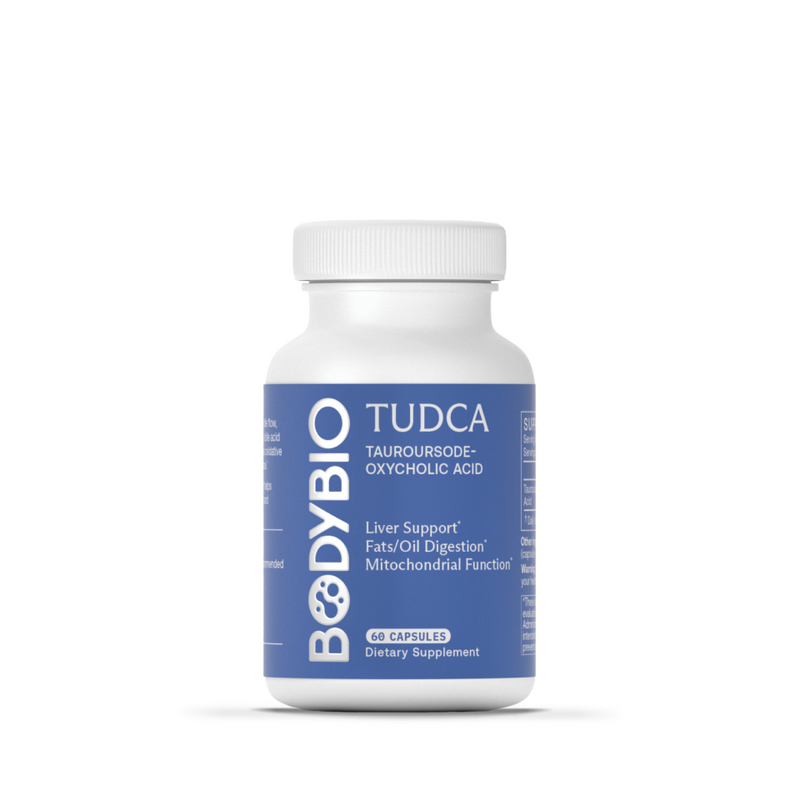Gut Detox Symptoms: What's Normal and How Long They Last
Authors:

Ashley Palmer
Nutritional Therapy Practitioner, Health & Wellness Expert
Key Takeaways:
Don’t worry — Feeling worse after starting a gut detox doesn't mean something's wrong. It means your body is doing exactly what it should: eliminating harmful pathogens and rebalancing your microbiome.
After a round of antibiotics, persistent digestive issues, or when supporting your body's natural detoxification pathways, your digestive system needs focused attention to realign your gut microbiome. When you take steps to rebalance your gut flora, uncomfortable but ultimately beneficial symptoms may appear as your system recalibrates and clears out pathogens like candida and toxins.
This guide explains which symptoms signal normal detoxification, the science behind why they occur, and evidence-based strategies to minimize discomfort.
Table of Contents:
-
Why Gut Detox Symptoms Happen
-
Common Symptoms During Gut Microbiome Rebalancing
-
How Long Does The Gut Detox Process Take?
-
Can a Gut Detox Make You Feel Sick?
-
Ways to Ease Your Gut Detox Symptoms
-
Navigating Gut Detox Symptoms Safely
Why Gut Detox Symptoms Happen
When harmful bacteria, yeast overgrowth, or other pathogens dominate your gut microbiome, your body sends some very clear signals that something's off. Supporting your gut health through dietary changes, targeted supplements, or other interventions can shift your body’s microbial landscape. As beneficial bacteria begin to thrive and harmful organisms start to die off, they release toxins into your system during their breakdown.
Your liver, kidneys, and lymphatic system kick into higher gear during this process. Instead of their usual workload, they're suddenly processing waste products from dying bacteria on top of everything else they normally handle. This increased demand on your body’s detoxification pathways creates the symptoms you experience.
Common Symptoms During Gut Microbiome Rebalancing
Certain symptoms typically appear as your gut microbiome shifts. Recognizing these patterns can help you distinguish between normal detox reactions and gut dysbiosis or larger signs that something might need more attention.
Bloating and Digestive Discomfort
One of the first signs that your gut microbiome is shifting involves changes in how your digestive system feels. Bloating, gas, and general abdominal discomfort are common as beneficial bacteria establish themselves, harmful bacteria and yeast die off, and your gut lining begins to heal.
This discomfort happens because your digestive processes are adjusting. As your gut flora rebalances, enzyme production changes and your intestinal motility may temporarily shift. You might notice these symptoms are worse after meals, particularly if you're introducing new probiotic-rich foods or supplements. This phase typically passes within a few days to a week as your system adapts to its new baseline.
Increased Bowel Movements or Diarrhea
Your body’s elimination patterns might change noticeably during a gut detox. Some people experience more frequent bowel movements or loose stools as their body works to clear out toxins and waste more efficiently than usual.
This increased elimination is your digestive system doing exactly what it should: moving things through. However, if diarrhea becomes severe or persists beyond a few days, check in with a healthcare provider to make sure you're not dealing with something more serious.
Conversely, some people experience slower motility aka constipation. This means your gut is a bit overwhelmed with all the toxin buildup and may require more minerals like magnesium to get things moving again. Other motility agents like aloe and senna may also be helpful temporarily.
Fatigue and Brain Fog
Feeling unusually tired or mentally fuzzy during a gut detox can be frustrating, especially when you're actively trying to improve your health. Fatigue and brain fog occur because your body is dedicating significant energy to the detoxification process. Your liver is working overtime to process and eliminate toxins, which can leave you feeling drained.
The gut-brain connection contributes here too. As your microbiome shifts, the production of neurotransmitters like serotonin (about 90% of which is produced in your gut) may temporarily fluctuate, affecting your energy levels and mental clarity. This fog lifts once your beneficial bacteria re-establish themselves.
Skin Breakouts and Rashes
Your skin is your body's largest organ of elimination, so it reflects what's happening internally. Breakouts, rashes, or other skin changes during a gut detox happen when your body releases toxins through your pores. You might notice acne in unusual places, small bumps, or mild rashes that weren't there before.
This skin reaction shows that your detoxification pathways are working hard. As your gut heals and the toxic load decreases, your skin clears and often looks healthier than before you started.
Headaches and Mood Changes
Some people may also experience mild to moderate headaches can occur during gut detox, particularly in the first few days. These often result from the release of toxins, changes in blood sugar regulation, or shifts in hydration status as your body processes waste more actively.
Since your gut produces neurotransmitters that regulate mood, temporary changes in gut bacteria can affect how you feel emotionally. Some people report irritability, mild anxiety, or feeling "off" during the initial stages of gut rebalancing. These mood changes are temporary and should improve as your microbiome stabilizes. Try not to make any life-changing decisions during the first few days of a detox!
How Long Does The Gut Detox Process Take?
The timeline for gut detox symptoms varies significantly from person to person, depending on your starting point, the severity of your gut imbalance, and the approach you're taking. Most people experience the most noticeable gut detox symptoms within the first 3-7 days of making changes to support their gut health.
For minor gut imbalances, gut detox symptoms might resolve within a week or two. More significant microbial shifts or healing from conditions like leaky gut can take several weeks to a few months. What matters most is that gut detox symptoms should gradually improve, not worsen over time.
Can a Gut Detox Make You Feel Sick?
Yes, and that's worth acknowledging upfront. A gut detox can temporarily make you feel worse before you feel better. This doesn't mean something is wrong with you or that you should stop immediately. It means your body is actively working to eliminate waste and rebalance your internal ecosystem. However, there's a difference between normal detox symptoms and signs that something isn't right.
Normal symptoms are mild to moderate, gradually improve over time, and don't significantly interfere with your daily life. You might feel tired or slightly uncomfortable, but you can still function.
Concerning symptoms include severe abdominal pain, high fever, persistent vomiting, blood in your stool, or symptoms that worsen over time rather than improve. These warrant immediate medical attention.
If you experience severe reactions, stop the cleanse and consult with a healthcare provider. Gut health is deeply personal, and what works for one person may not suit another. A gentler approach or professional guidance might be necessary for your specific situation.
Ways to Ease Your Gut Detox Symptoms
There are a few ways you can support for your body's detoxification pathways naturally. These actions can significantly reduce discomfort and help you move through this phase more smoothly.
Hydration and Proper Nutrition
Replenishing electrolytes and drinking plenty of water is critical for flushing endotoxins through your kidneys and maintaining lymphatic flow. Aim for half your body weight in ounces daily.
Water alone isn't enough. Your cells require specific minerals—sodium, potassium, magnesium—to transport water across cell membranes and maintain the electrical gradients necessary for detoxification.
e-Lyte provides these electrolytes in their most bioavailable (more easily absorbable) forms, without the sugars or artificial ingredients that can feed pathogenic bacteria.* Proper cellular hydration accelerates toxin elimination and reduces detox symptom severity.
Focus on nutrient-dense, easily digestible foods during this time. Bone broth, cooked vegetables, lean proteins, and healthy fats provide the building blocks your body needs to repair and regenerate. Skip processed foods, excess sugar, and alcohol, which can stress your detoxification pathways further and potentially feed the harmful bacteria you're trying to eliminate.
Supporting Your Gut Microbiome
Your gut bacteria need targeted support to establish dominance over pathogenic species. Rather than probiotics, postbiotics provide more direct support to your gut lining.* Butyrate, a short-chain fatty acid, fuels the cells lining your intestinal wall and helps maintain the barriers that prevent toxin leakage.*
Bile does more than digest fats. It acts as your body's primary toxin elimination pathway, binding to waste products and carrying them out through your stool. Poor bile flow creates a bottleneck in detoxification.
TUDCA (tauroursodeoxycholic acid) is a bile salt that increases bile flow and protects liver cells during detoxification.* By optimizing this elimination pathway, TUDCA helps reduce both the severity and duration of detox symptoms.*
Getting Enough Rest and Managing Stress
Your body does its deepest healing work while you sleep. During a gut detox, prioritizing rest gives your system the downtime it needs to repair and regenerate. Aim for 7-9 hours of quality sleep each night, and don't hesitate to scale back on your schedule if possible.
Stress management also plays a vital role in gut health. Chronic stress disrupts your gut microbiome and slows healing, creating a cycle that works against your detox efforts. Gentle practices like walking, stretching, deep breathing, or meditation can help keep your stress response in check while your body does its important work.
Navigating Gut Detox Symptoms Safely
Your microbiome doesn't rebalance in a few days, it takes weeks to months of consistent support. Gut detox symptoms are physical signs of active microbial rebalancing. The difference between struggling through a detox and navigating it successfully comes down to supporting your body’s natural systems: hydration with proper electrolytes, bile flow optimization, and stress reduction.

